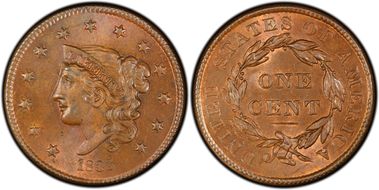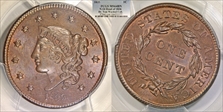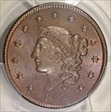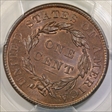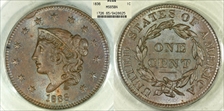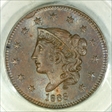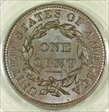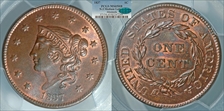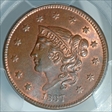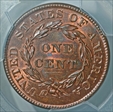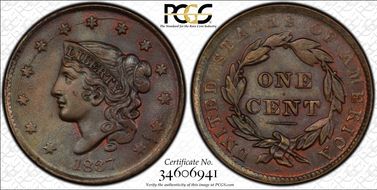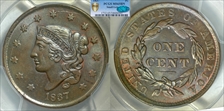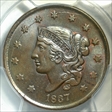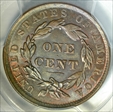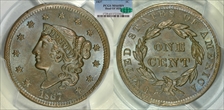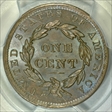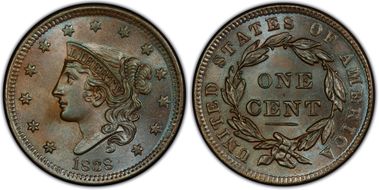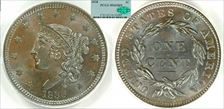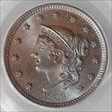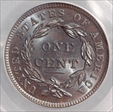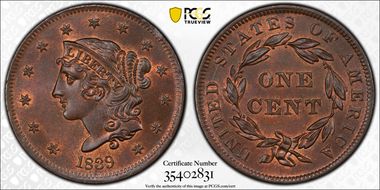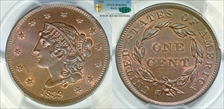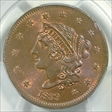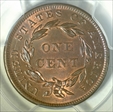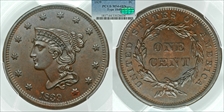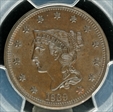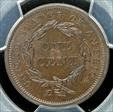Kneass-Gobrecht Transitional Head Large Cents (1835-1839) 的展示图片库
Lustrous light brown with subtle overtones of bluish steel, particularly on the obverse. Traces of mint red on the obverse and at least 5% on the reverse. The surfaces are satiny, and the eye appeal excellent. Just a few microscopic marks, including a spec of dark toning in the field under the chin, some hairlines at stars 12 & 13, and at the feet of the second A in America. MDS with very fine flowlines. The center dot is tiny but visible.
Lustrous light brown with subtle overtones of bluish steel, particularly on the obverse. Traces of mint red on the obverse and at least 5% on the reverse. The surfaces are satiny, and the eye appeal excellent. Just a few microscopic marks, including a spec of dark toning in the field under the chin, some hairlines at stars 12 & 13, and at the feet of the second A in America. MDS with very fine flowlines. The center dot is tiny but visible.
Lustrous light brown with subtle overtones of bluish steel, particularly on the obverse. Traces of mint red on the obverse and at least 5% on the reverse. The surfaces are satiny, and the eye appeal excellent. Just a few microscopic marks, including a spec of dark toning in the field under the chin, some hairlines at stars 12 & 13, and at the feet of the second A in America. MDS with very fine flowlines. The center dot is tiny but visible.
Lustrous light brown with subtle overtones of bluish steel, particularly on the obverse. Traces of mint red on the obverse and at least 5% on the reverse. The surfaces are satiny, and the eye appeal excellent. Just a few microscopic marks, including a spec of dark toning in the field under the chin, some hairlines at stars 12 & 13, and at the feet of the second A in America. MDS with very fine flowlines. The center dot is tiny but visible.
N-3; Noyes Die State C/D. (No N-3 PCGS attributed MS65s in the census, but 2 in MS66). This is the usually seen die state with a small rim break over star 6. Most examples of this variety have a rim break at this location. The reverse has a thin horizontal bisecting die crack. Lustrous medium brown surfaces with hints of pale blue color. An attractive example for the date. Provenance: from the ESM Collection. Earlier from Heritage’s sale of the Ohio Collection, Jan. 2002 Fun Signature Sale, lot 5402; Heritage’s sale of the Craig A. Stevens Registry Collection of Large Cents, April 2006 CSNS Signature Auction, Lot 286
N-3; Noyes Die State C/D. (No N-3 PCGS attributed MS65s in the census, but 2 in MS66). This is the usually seen die state with a small rim break over star 6. Most examples of this variety have a rim break at this location. The reverse has a thin horizontal bisecting die crack. Lustrous medium brown surfaces with hints of pale blue color. An attractive example for the date. Provenance: from the ESM Collection. Earlier from Heritage’s sale of the Ohio Collection, Jan. 2002 Fun Signature Sale, lot 5402; Heritage’s sale of the Craig A. Stevens Registry Collection of Large Cents, April 2006 CSNS Signature Auction, Lot 286
N-3; Noyes Die State C/D. (No N-3 PCGS attributed MS65s in the census, but 2 in MS66). This is the usually seen die state with a small rim break over star 6. Most examples of this variety have a rim break at this location. The reverse has a thin horizontal bisecting die crack. Lustrous medium brown surfaces with hints of pale blue color. An attractive example for the date. Provenance: from the ESM Collection. Earlier from Heritage’s sale of the Ohio Collection, Jan. 2002 Fun Signature Sale, lot 5402; Heritage’s sale of the Craig A. Stevens Registry Collection of Large Cents, April 2006 CSNS Signature Auction, Lot 286
Choice lustrous medium steel brown and light olive with a third of the mint red remaining on both sides. The only notable marks, and they are trivial, are a small puff of darker bluish steel toning at the dentil tips right of star 11 and faint traces of an old fingerprint on the front of the face. MDS. The die cracks on the reverse are clear (an un-cracked example is unknown) and fine die clash marks are visible on both sides. Not seen by Noyes or Bland. The N3 attribution and Ahumada provenance are noted on the label. Tied for finest RB of the variety at both services. Ex Heritage 1991 Spring ANA Sale, lot 92 (lot ticket included).
Choice lustrous medium steel brown and light olive with a third of the mint red remaining on both sides. The only notable marks, and they are trivial, are a small puff of darker bluish steel toning at the dentil tips right of star 11 and faint traces of an old fingerprint on the front of the face. MDS. The die cracks on the reverse are clear (an un-cracked example is unknown) and fine die clash marks are visible on both sides. Not seen by Noyes or Bland. The N3 attribution and Ahumada provenance are noted on the label. Tied for finest RB of the variety at both services. Ex Heritage 1991 Spring ANA Sale, lot 92 (lot ticket included).
Choice lustrous medium steel brown and light olive with a third of the mint red remaining on both sides. The only notable marks, and they are trivial, are a small puff of darker bluish steel toning at the dentil tips right of star 11 and faint traces of an old fingerprint on the front of the face. MDS. The die cracks on the reverse are clear (an un-cracked example is unknown) and fine die clash marks are visible on both sides. Not seen by Noyes or Bland. The N3 attribution and Ahumada provenance are noted on the label. Tied for finest RB of the variety at both services. Ex Heritage 1991 Spring ANA Sale, lot 92 (lot ticket included).
N-5--the only Small Letter "Head of 36" Plain Cord die pair. A bold, swirling luster flows uninterrupted along light brown surfaces that have an icy, steel blue iridescent hue over smooth fields. Tinges of gold and hints of original mint red cling to protected areas of the devices. Bluntly struck, as typical for the variety (Breen pg. 209) and displaying the extensive obverse die crack that identifies the marriage. Sold on 11/05 and 2/09 through Heritage as a “Head of 38”.
N-5--the only Small Letter "Head of 36" Plain Cord die pair. A bold, swirling luster flows uninterrupted along light brown surfaces that have an icy, steel blue iridescent hue over smooth fields. Tinges of gold and hints of original mint red cling to protected areas of the devices. Bluntly struck, as typical for the variety (Breen pg. 209) and displaying the extensive obverse die crack that identifies the marriage. Sold on 11/05 and 2/09 through Heritage as a “Head of 38”.
N-5--the only Small Letter "Head of 36" Plain Cord die pair. A bold, swirling luster flows uninterrupted along light brown surfaces that have an icy, steel blue iridescent hue over smooth fields. Tinges of gold and hints of original mint red cling to protected areas of the devices. Bluntly struck, as typical for the variety (Breen pg. 209) and displaying the extensive obverse die crack that identifies the marriage. Sold on 11/05 and 2/09 through Heritage as a “Head of 38”.
N-5--the only Small Letter "Head of 36" Plain Cord die pair. A bold, swirling luster flows uninterrupted along light brown surfaces that have an icy, steel blue iridescent hue over smooth fields. Tinges of gold and hints of original mint red cling to protected areas of the devices. Bluntly struck, as typical for the variety (Breen pg. 209) and displaying the extensive obverse die crack that identifies the marriage. Sold on 11/05 and 2/09 through Heritage as a “Head of 38”.
Head of 1838 (N-9). Beaded hair cord, small letters. Great luster and toning. Late die state with ample obverse and reverse die cracks. Wright’s die variety 7/G. Noyes die state 7D/GD.
Head of 1838 (N-9). Beaded hair cord, small letters. Great luster and toning. Late die state with ample obverse and reverse die cracks. Wright’s die variety 7/G. Noyes die state 7D/GD.
Head of 1838 (N-9). Beaded hair cord, small letters. Great luster and toning. Late die state with ample obverse and reverse die cracks. Wright’s die variety 7/G. Noyes die state 7D/GD.
16 die varieties. N-7. Head of 38: Petite Head. Small Letters, Beaded Hair Cords. (All 16 1838 die pairs have beaded cords). Wright's die variety 7/G. Unbelievable luster. CAC Approved.
16 die varieties. N-7. Head of 38: Petite Head. Small Letters, Beaded Hair Cords. (All 16 1838 die pairs have beaded cords). Wright's die variety 7/G. Unbelievable luster. CAC Approved.
16 die varieties. N-7. Head of 38: Petite Head. Small Letters, Beaded Hair Cords. (All 16 1838 die pairs have beaded cords). Wright's die variety 7/G. Unbelievable luster. CAC Approved.
16 die varieties. N-7. Head of 38: Petite Head. Small Letters, Beaded Hair Cords. (All 16 1838 die pairs have beaded cords). Wright's die variety 7/G. Unbelievable luster. CAC Approved.
Booby Head. N-13; R-2. Nicely re-punched star 12; die cracks through much of United States and, contrary to Noyes, Wright and Newcomb were right in a 3rd crack through ES. Remnants of the initial orange red in protected regions, but the open fields and high points are brown. Red cartwheel luster and crisply struck with only trivial marks save for an unobtrusive tick on the O of ONE and a small obverse rim depression at 1:30.
Booby Head. N-13; R-2. Nicely re-punched star 12; die cracks through much of United States and, contrary to Noyes, Wright and Newcomb were right in a 3rd crack through ES. Remnants of the initial orange red in protected regions, but the open fields and high points are brown. Red cartwheel luster and crisply struck with only trivial marks save for an unobtrusive tick on the O of ONE and a small obverse rim depression at 1:30.
Booby Head. N-13; R-2. Nicely re-punched star 12; die cracks through much of United States and, contrary to Noyes, Wright and Newcomb were right in a 3rd crack through ES. Remnants of the initial orange red in protected regions, but the open fields and high points are brown. Red cartwheel luster and crisply struck with only trivial marks save for an unobtrusive tick on the O of ONE and a small obverse rim depression at 1:30.
Booby Head. N-13; R-2. Nicely re-punched star 12; die cracks through much of United States and, contrary to Noyes, Wright and Newcomb were right in a 3rd crack through ES. Remnants of the initial orange red in protected regions, but the open fields and high points are brown. Red cartwheel luster and crisply struck with only trivial marks save for an unobtrusive tick on the O of ONE and a small obverse rim depression at 1:30.
One die pair (N-8) for all coinage, and only 200,000 minted. Petite Head, first year of the Braided Hair design (1839-1843), and the "start" coin of the "Braided Hair" large cent series (1839-1857). Deep lavender/blue tones with phenomenal luster. Very tough to find in MS64 or better, especially when CAC certified.
One die pair (N-8) for all coinage, and only 200,000 minted. Petite Head, first year of the Braided Hair design (1839-1843), and the "start" coin of the "Braided Hair" large cent series (1839-1857). Deep lavender/blue tones with phenomenal luster. Very tough to find in MS64 or better, especially when CAC certified.
One die pair (N-8) for all coinage, and only 200,000 minted. Petite Head, first year of the Braided Hair design (1839-1843), and the "start" coin of the "Braided Hair" large cent series (1839-1857). Deep lavender/blue tones with phenomenal luster. Very tough to find in MS64 or better, especially when CAC certified.




















